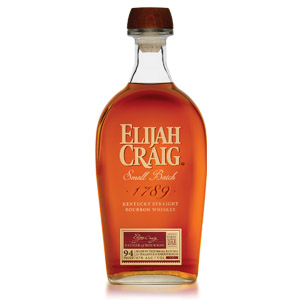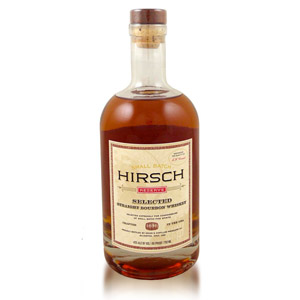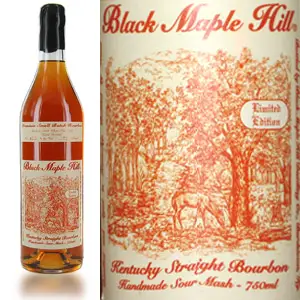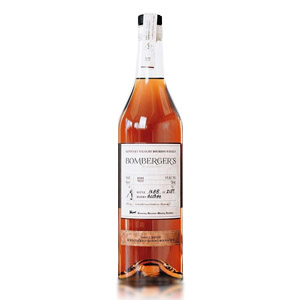Today, I’m here to talk about another fallen soldier in the whisky war of attrition known as “supply vs demand”. Heaven Hill, in a statement issued in early 2016, announced that it would be replacing Elijah Craig 12 year-old with a non-age-statement version (“Small Batch”) which contains whiskey aged 8 to 12 years of age, due to “increasing pressure” to “stocks of 12-year-old barrels”. As the cynics in the comment section will point out no doubt, without an age statement it could literally all be 4 years old, since the word of a PR person assuring a “blend of barrels between 8 and 12 years of age” carries no legal weight. I prefer to take them at their word (at least they didn’t make this switch in attempted secrecy) and will assume the bourbon is mostly 8 years old, with a smattering of older barrels up to 12. Note that the Barrel Proof edition still has a 12-year age statement.
Honestly, I’m not too torn up about it, as I wasn’t a huge fan of the 12 year. I rated the Elijah Craig 12 year-old a solid “Try Before Buy”, and when I saw that the new NAS Small Batch is actually priced a little lower than its predecessor ($25 ish vs. $30 ish), I thought I’d give the new one a try. If nothing else, a $25 NAS bourbon is useful for cocktails, right?
Nose: A little shy. The first impression is of an indeterminate nuttiness. Some sweet vanilla, banana cream, and a hint of coconut underscore the reticent oak. Round and soft, but without much presence. As usual, a rest in the glass reveals more vanilla and more refined sugar (as in vanilla cake frosting).
Palate: Thin body. Very soft, with a mild tongue burn. Again, there isn’t much to describe beyond nondescript nut butter, tannic oak, and cake frosting. A bitter note suggests but does not assert spices such as clove and cinnamon.
Finish: More sweetness here, with black licorice, nonpareils, drying tannins, and very little to no bitterness. Fades inoffensively, self-effacing.
With Water: A few drops of water yield a vegetal (grassy) note, and increases the nose tickle. The palate is slightly more alert, but does not add anything substantial. Water optional.
Overall: The word “shy” describes just about every facet of the experience of drinking this whiskey. It nearly glides along the palate without interacting much with the taste buds (hence the “soft” descriptor), and while it has a nice round, balanced interplay of tropical fruit, wood, and alcohol, the whole is dialed down to “low”. Oddly, it doesn’t taste particularly watery or watered-down, but rather that the alcohol carries little with it in the way of flavor compounds. This might be a good whiskey to balance subtle ingredients in a contemplative cocktail, where you don’t want the bourbon to overwhelm something else. At $25, that’s not bad, but it feels like this is crafted for an audience that doesn’t really want to taste their bourbon. A more likely explanation is this is what happens when you take a “value” bourbon and compromise on the barrel ages of the components. Drop 4 years and you lose a lot of oaky sugars in the aroma, roundness on the palate, and spices in the finish. That tell-tale grassy note that showed when water was added is also a consequence of the younger juice. At the lower price-point this is still a “Try Before Buy”, but I’ve tried it and I won’t be buying more.









Hey n00b,
I have never been a big fan of the Elijah Craig profile either. I didn’t like it at 12 years old, I don’t like it at barrel proof, I don’t like any of the current store selections I’ve tried, and I don’t like the new NAS version. That’s unfortunate because it is good quality whiskey at a good price, just not in my wheelhouse. Odd, because I love most everything else that Heaven Hill pumps out of its stills and puts into oak, even all the various cats and dogs brands that HH sells or supplies to resellers. Just not the EC house profile.
That said, I am not as hard on the major American distilleries about NAS releases as I am on the Scotch Whisky Industry, for the most part. While there are any number of dumb overpriced releases in that category/type/label/whatever-not-interested-in-arguing-semantics, there are plenty of delicious and consistently good NAS releases priced in the $10-$35 range. Additionally, for a straight bourbon to be NAS, it must be a minimum of 4 years old (you seem to imply 2 in your review, but anything under 4 years of age must be age stated. I think you might be confusing the 2 year minimum for “Straight”, but Straight whiskey of any type still must be age stated if it is between 2-4 years old). Due to the vast differences in production of the spirit and price vs scotch, I find 4 year old bourbon to be perfectly acceptable in that price range. If it happens to be part of a “small batch” that incorporates older and younger barrels to hit a certain flavor profile, I am okay with that, since I am not paying exhorbitant prices. Contrast that with the “new normal” in the Scotch Whisky Industry of the $100 NAS fancypants bottle.
That is not to say that the American Spirits Industry does not deserve its fair share of criticism for its own bizarre practices, but on this particular issue I am not especially miffed. That said, the bourbon/rye industry seems to be stepping toward a new normal: age stated releases skyrocketing in price. Far too many age stated releases are commanding prices double, triple, or quadruple what they did a few years ago. Couple that with the fact that producers can slap “Limited Edition” on just about anything, charge exhorbitant prices, then sell out in seconds, and it’s not hard to see that we have our own domestic whiskey bubble inflating toward another glut. At least production appears to finally be on the verge of catching up with current demand.
Cheers,
Eric
Eric, Thanks for the 4 y/o correction, you’re right, I’d forgotten that it must be labelled if under 4. I’ll fix that. I see a lot of parallels in the bourbon / scotch scene, I just think the price scale is shifted (although then I see something like the latest Master’s Keep from Wild Turkey, which is $120). The fact is that both scotch and bourbon producers are running (or have run) out of barrels aged at their “old” flagship level, and of course anything older. Whether you end up paying $80 for NAS scotch that’s younger than it used to be, or $35 for NAS bourbon that’s younger than it used to be, in both cases you’re paying the same (or even more) for less aging. In some cases that may not be noticeable quality-wise, but in many (like this review), it does.
Given that a lot of whisky has lost its age information PRECISELY to AVOID legal accountability with regard to composition, I don’t see any reason to take any industry person’s “word” on much of anything, much less age, in the current slimy climate – and the current slimy climate was created BY industry people simply for profit.
If anyone ever runs out of NAS products, they can always “make” some more in this “category” by peeling the labels off of whatever they have left and – for what it’s worth – that’s entirely the truth.
I don’t follow the logic of “that said, I am not as hard on the major American distilleries about NAS releases as I am on the Scotch Whisky Industry, for the most part”. I’m not sure if the argument is that age matters less with bourbon than scotch (as it often isn’t aged as long as scotch, it should matter more on a year-by-year basis), or whether withholding age information with bourbon is still somewhat the hallmark of cheaper booze. Even if the latter is true, bourbon will see scotch’s profit maximization though nonsensical means and then follow suit. The average bourbon drinker is certainly no smarter than the average scotch drinker, so the same bullshit will work equally well.
http://recenteats.blogspot.ca/2014/02/the-bourbon-fountain-of-youth-dropped.html
Hi Jeff,
I don’t judge the bourbon and rye industry as harshly because the quality dropoff has not been remotely similar to the Scotch whisky industry in length and magnitude for the products I enjoy. I have been active in the bourbon community for over 13 years, and for every release that has been dropped or lost its age statement, new releases of similar quality have come online.
While the bourbon industry certainly has a plethora of issues, the fact of the matter is that I can buy whiskey I enjoy just as much as I did 13 years ago for largely the same cost. Even taking Elijah Craig 12 as an example, you will find many over at straightbourbon and other bourbon nerd hangouts who prefer the new and younger profile. While we may be missing out on the glut era bourbon that had honey barrel after honey barrel dumped into cheap releases, the fact of the matter is that such practices would have eventually caused the death of the industry.
Contrasting that with the Scotch Whisky Industry, comparing old favorite age stated releases from just a few years ago like HP12 to their current bottlings is downright depressing.
The bottom line is that while I do not approve of the act of removing information from the customer, that is only part of the equation. Bruichladdich can be as transparent as they wish, but most of what they produce in the name of and transparency is still mediocre whisky that I will not buy. So if I have to choose between losing some information–information the customer never necessarily had in the first place, given the lack of transparency that goes into the batching process of bourbon AND scotch–and losing quality, I know what I choose, because I can still buy world class bourbon for $15-$35. It might be different from yesteryear, but it is still just as good by my palate.
By all means, continue your crusade for transparency. I applaud it, though your blunt rants do little to win over many skeptics.
Cheers,
Eric
Hi Eric,
Thanks for the note. What I take from the central thrust of your response is that although you “do not approve of the act of removing information from the customer”, said act has not, in your estimation, yet done as much damage to bourbon as is has to scotch. I think it’s an arguable point as far as it goes; finding bourbon a narrower profile without much relative age to begin with, I don’t think that most bourbon really IS as vulnerable to damage from NAS marketing as scotch. I would disagree, however, if it’s being said that quality/value of what remains in bourbon somehow makes nonsensical marketing “alright” or acceptable in the case of bourbon as opposed to scotch, and therein lies the rub.
Although your point about the ample room to improve the quality of product information itself is well made, you “do not approve of the act of removing information from the customer” yet IF you have “to choose between losing some information… and losing quality, I know what I choose”. In your accepting the false “bargain” of trading information for quality, it’s little wonder that fighting for transparency is “my” crusade as opposed to yours. How does information, in and of itself, “cost” anyone quality? If they gave you the information about what you’re drinking on any given NAS product, how would it somehow follow that quality would “have” to suffer, or that prices would “have” to be higher? Does age information and label design really “have” to result in all these terrible things in the minds of thinking people, or isn’t this really just the confidence game that the industry has sold them on? If removing product information has, instead, actually resulted in the decline of quality and value in scotch in terms of the current trending in resulting products (if we’re agreed on that), how will it not do so for bourbon, or has the process really just begun in bourbon as scotch’s increasing vulnerability makes it more likely for bourbon TO follow suit?
In terms of my approach, I did used to candy this stuff much more for people in order to make it more appetizing. What I found over time, however, is that for all their other shortcomings, the central problem with my tactics for most people is that I advocate actual, not theoretical, consumer change/action, period. Things have, quite perpetually, “not yet” gotten so bad that consumers won’t simply continue to deny what’s plainly before them instead of acknowledging that the recently embraced disconnect between quality (however assessed), product content and information ABOUT product content was, pretty obviously, designed to take advantage of the naive and trusting (and a large number of consumers who simply don’t understand cask physics). People will complain about the state of whisky, even understand some of the mind games being played on them, but what most won’t do is acknowledge their role in putting whisky in the relatively sad state that it’s in, because that might lead them to realize that THEY should take action instead of leaving it to someone else. Such are the days, but I’m past the time of sugar coating that which stares people in the face on the basis that it will inhibit the action that they’re not taking anyway. I’m not looking to make “converts to my cause”; I’m, quite unapologetically, just looking to wake people up.
Thanks for the warnings. Based on the tasting notes it sounds like they merely re-branded Evan Williams Small Batch 1783 as Elijah Craig 1789 with a slight ABV bump. 1783 is (was?) surprisingly well-aged, somewhere in the 8 year range, yet has the thin and ethereal palate you describe, somewhere in the vicinity of the recent EW single barrels.
HH still produces good value bourbon–at least if you live near Kentucky, not sure about the rest of the world–but I’m sorry to see them dilute flagship brands.
Evan Williams Black Label used to carry a 7 year age statement. That was truly a golden age of bourbon. EWBIB is my favorite HH product at the moment.
Based on feedback found on this fine site and recently reiterated by our friend Ralfy, just picked up an age-stated bottle of Eagle Rare 10 here in ATL for the more-than-fair price of US $32. I concede that cask strength Booker’s carries more flavor (at twice the price) but Eagle Rare 10 slots itself quite nicely toward the top of that next category containing: WR, KC, 4R (small batch), EC 12 and a smattering of others.
Stick to drinking and belaboring “scotch”, genius.
I am a fan-boy of EC SB 12, with enough of it now safely in the bunker to ride out this latest “Whisky – Boom”.
I also like Evan Williams Black and WT 101 as a daily pour.
I see this new NAS Small Batch product not as a replacement to the age stated 12, rather as a premium Evan Williams Black, with “extra age”.
At around 30 dollars for EC NAS… it is definately not the value that the “Red 12” was.
That said…the way production ( and stock ) capacity has been ramping up, I would not be surprised to see “Red 12” re-introduced in a few years.
elijah craig, one of my go to bourbons…I go with what is tasty to me and don’t abide by other peoples’ reviews or opinions, I read them for entertainment. whiskey just like your taste in women is subjective…the best whiskey is what you love to drink, and with me, drink unadulterated.